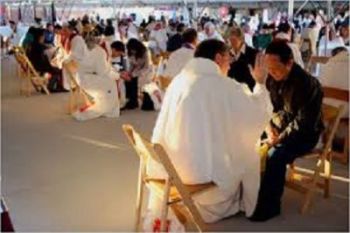 The first reading for mass today from the first Letter of Saint John talks about the different types of sin. These verses in scripture are the basis for the Catholic belief in mortal sin and venial sin. (1 Jn 5: 14-21) The Catechism of the Catholic Church goes into more detail about what the criteria is for mortal sin, but the three criteria for a sin to be mortal is that: the sin must be a grave or serious sin, committed with full knowledge and deliberate consent of the will. cc 1857 If a sin does not meet these three criteria, no matter how serious the sin may be, then it is a venial sin.
The first reading for mass today from the first Letter of Saint John talks about the different types of sin. These verses in scripture are the basis for the Catholic belief in mortal sin and venial sin. (1 Jn 5: 14-21) The Catechism of the Catholic Church goes into more detail about what the criteria is for mortal sin, but the three criteria for a sin to be mortal is that: the sin must be a grave or serious sin, committed with full knowledge and deliberate consent of the will. cc 1857 If a sin does not meet these three criteria, no matter how serious the sin may be, then it is a venial sin.
The first reading today says that “anyone begotten by God does not sin; but the one begotten by God he protects, and the Evil One cannot touch him.” This is a little confusing in light of Catholic teaching. Perhaps it means that when a person is in a state of grace through frequently receiving the sacraments of confession and communion, it is more difficult to fall into mortal sin. Those truly born of the Spirit do not want to offend God, because they love Him.
Without a genuine love for God, born from the Spirit and kept alive by the sacraments, it is easy to fall from grace. We know that Judas was a disciple of Christ, but he did not truly love the Lord or else he would not have betrayed him for 30 pieces of silver. Judas was one of Christ’s inner circle, but things were not right with him from the beginning. None of the other disciples would have betrayed Jesus, because they truly loved him.
The first reading goes on to tell us what we are already keenly aware of in modern times, that “the whole world is under the power of the Evil One.” And to “be on your guard against idols.” Judas loved money more than Jesus. What or who, do we love more than Jesus? Can we honestly say that Christ has first place in our hearts? Do our actions reflect this as well? If not, it might be time to realign our priorities.
One thing that isn’t brought up very much in the gospels, is that Jesus baptized people. We hear a great deal about Jesus healing the sick, feeding the hungry and performing miracles, but very little is said about Jesus baptizing people. Today’s gospel clearly states that he did. (Jn 3: 22-30) Evidently John’s disciples did not anything about Jesus baptizing people before either, because they asked John about it. John basically said that this was as it should be. Jesus must increase and he must decrease and John was not only ok with it, but his joy was complete because Jesus was here.
As a side note, baptism is such a wonderful thing because it removes all sin, both mortal and venial. Most Catholics are baptized as babies, but those who are baptized as adults through the RCIA process can attest to what a healing thing baptism is. Baptism creates a clean slate and a fresh, new chance to lead a better life.
There is no sin that can not be forgiven after baptism though, in the sacrament of confession other than blasphemy. cc 2148 It is very difficult to meet the criteria for blasphemy though. It’s like the first reading for mass says, “the one begotten by God he protects, and the Evil One cannot touch him.”
The devil is real, but we need not fear him as long as we frequent the sacraments and stay close to the Lord through a regular prayer life. Grace strengthens us and protects us and that is why it is so important to remain in a state of grace or a right relationship with God.
